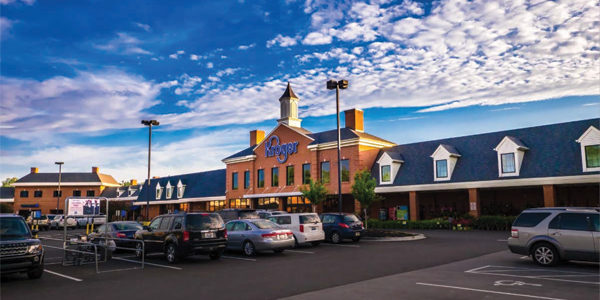Bringing home the groceries: interview with Kevin Condon

 Since its founding in 1883 in Cincinnati, The Kroger Co. has a long history of being at the forefront of retail grocery operations. Today, Kroger is a $115 billion company operating in 35 states. Kroger has been an innovator throughout its storied history. In 1901, it was the nation's first grocer to open its own bakeries. It was also the first to sell both meats and groceries within the same store.
Since its founding in 1883 in Cincinnati, The Kroger Co. has a long history of being at the forefront of retail grocery operations. Today, Kroger is a $115 billion company operating in 35 states. Kroger has been an innovator throughout its storied history. In 1901, it was the nation's first grocer to open its own bakeries. It was also the first to sell both meats and groceries within the same store.
That spirit of innovation continues today. The company owns 38 manufacturing facilities that produce about 40 percent of the private-label brands sold in Kroger stores. Recently, it established automated microfulfillment centers to expedite the processing of e-commerce orders and is testing the use of autonomous vehicles for home delivery.
At the center of the innovation is Kevin Condon, Kroger's senior director of engineering and supply chain network strategy. He recently talked with DC Velocity Editorial Director David Maloney about some of the programs under way at the grocery chain, including "Restock Kroger," the company's initiative to "redefine the food and grocery customer experience in America."
Q: Kroger has done more than practically any other grocery chain in envisioning the retail grocery store of the future. Why has the company taken this leading role in technology investment and deployment?
A: While we tend to focus on things like robot-powered fulfillment centers and autonomous delivery vehicles when we think about the future, the truth is that Kroger has been a leader in strategic decision-making and progressive technology investments for our entire 135-year history. You can look as far back as combining the butcher and the baker in the same storefront, the introduction of bar codes and optical scanners, or the more recent customer personalization made possible by data science.
No matter how far back you explore Kroger's history, you can find examples of the company thinking differently about the future of grocery retail. It should come as no surprise that when we launched the Restock Kroger initiative, redefining the grocery customer experience was the first driver we highlighted.
Q: What will your supply chain look like in 10 years? Will there still be stores as we know them today?
A: Stores today certainly don't look the same as they did 10 years ago, and I would anticipate they'll look even more different 10 years from now. Even the past one to two years have seen major changes, with automation, technology, and new processes that formerly would have been seen only in supply chain or manufacturing showing up at retail stores. These types of changes are indicative of an evolving definition of the supply chain to include not just getting products to the stores, but also everything it takes to fulfill a customer's order of anything, anytime, anywhere.
Q: How does your role tie into the innovations that Kroger is undertaking?
A: We're on the front lines of executing the strategies that support the vision of Restock Kroger. "Partnering for customer value" is a major driver of our company's plan to redefine the grocery customer experience, and through partnerships with companies like Ocado and Walgreens, we're deploying supply chain solutions that support that future vision.
Traditionally, network strategy has focused on optimizing capacity utilization and minimizing costs associated with inventory, processes, and transportation. With the evolving expectations of our customer, our network strategy also evolves to include building capacity to support our "anything, anytime, anywhere" customer expectations.
Q: Kroger plans to build 20 highly automated facilities in partnership with British online retailer and technology company Ocado over the next three years. What capabilities will these facilities give Kroger?
A: Kroger's traditional supply chain has been optimized over decades with an uncomplicated goal: deliver products to the store in the right quantities, at the right time, and at the lowest possible cost. A rapid retrofit of our traditional network with direct-to-consumer capability would be inconceivable and cost-prohibitive. Ocado has established itself as one of the world's largest dedicated online grocery retailers and has created game-changing technology to support that business.
Ocado's solution combines robotics and mechanical equipment with warehouse operating and control systems, as well as optimization and route planning for delivery. With the Ocado partnership, we will leverage these capabilities and accelerate the reimagination of the Kroger supply chain.
While our traditional network remains a critical part of our supply chain ecosystem, the customer fulfillment network enabled by Ocado's technology allows us to be extremely efficient and accurate in fulfilling customers' orders and delivering them to their homes or wherever they choose.
Q: Could you talk a little bit about your online grocery home delivery service, Kroger Ship?
A: With Kroger Ship, we've made a bold commitment to providing a seamless customer experience that offers anything they want, anytime they want it, anywhere they want it. The method for getting that order to the customer will be determined by many factors and will leverage all of our supply chain assets: our distribution centers, Kroger Ship fulfillment centers, Ocado automated "sheds," and of course, our stores.
Q: How do you balance maintaining a traditional supply chain while also undertaking innovation?
A: One of the keys to consider with a bimodal supply chain is that "traditional" and "innovative" shouldn't be looked at independently. The reality is that we continue to invest and update our traditional supply chain through innovation. We have advanced automation systems in our traditional supply chain that have been creating value for nearly 20 years.
Sometimes, maintaining the traditional just means replacing forklifts or conveyor motors. But maintaining the traditional can also leverage innovation and emerging technologies. This is most effectively accomplished through controllable pilots and through research and development initiatives, allowing our team to test and learn quickly and then roll out programs that are scalable, robust, and sustainable.
Q: You have a pilot program in Arizona using robotics company Nuro's autonomous vehicles for home delivery. How is that going and what have you learned from it?
A: A partnership with an innovative company like Nuro is extremely exciting for someone in the supply chain strategy space. The fact that we've now expanded the pilot into a second market in Houston is encouraging for the future of the program. I'm looking forward to evaluating applications throughout various supply chain deployments as we learn more about the capabilities and advantages of autonomous delivery.
Q: You also have a pilot program with Walgreens to send customer orders to Walgreens stores for pickup. How is it working?
A: The exploratory pilot with Walgreens creates an exciting opportunity to learn more about how customers want to engage with Kroger and our brands. With Kroger Express [a program through which a select range of Kroger products is offered at Walgreens stores] at 13 test stores in northern Kentucky, we're learning more about supply chain opportunities to support a data-driven grocery assortment in a format different from a traditional Kroger store.
We're also offering our "Kroger Pickup" click-and-collect service at Walgreens locations, which expands options for customers to pick up their orders at even more convenient locations. As this pilot progresses, we're looking forward to creating transformative solutions within the supply chain to support this partnership.
Related Articles

Copyright ©2024. All Rights ReservedDesign, CMS, Hosting & Web Development :: ePublishing